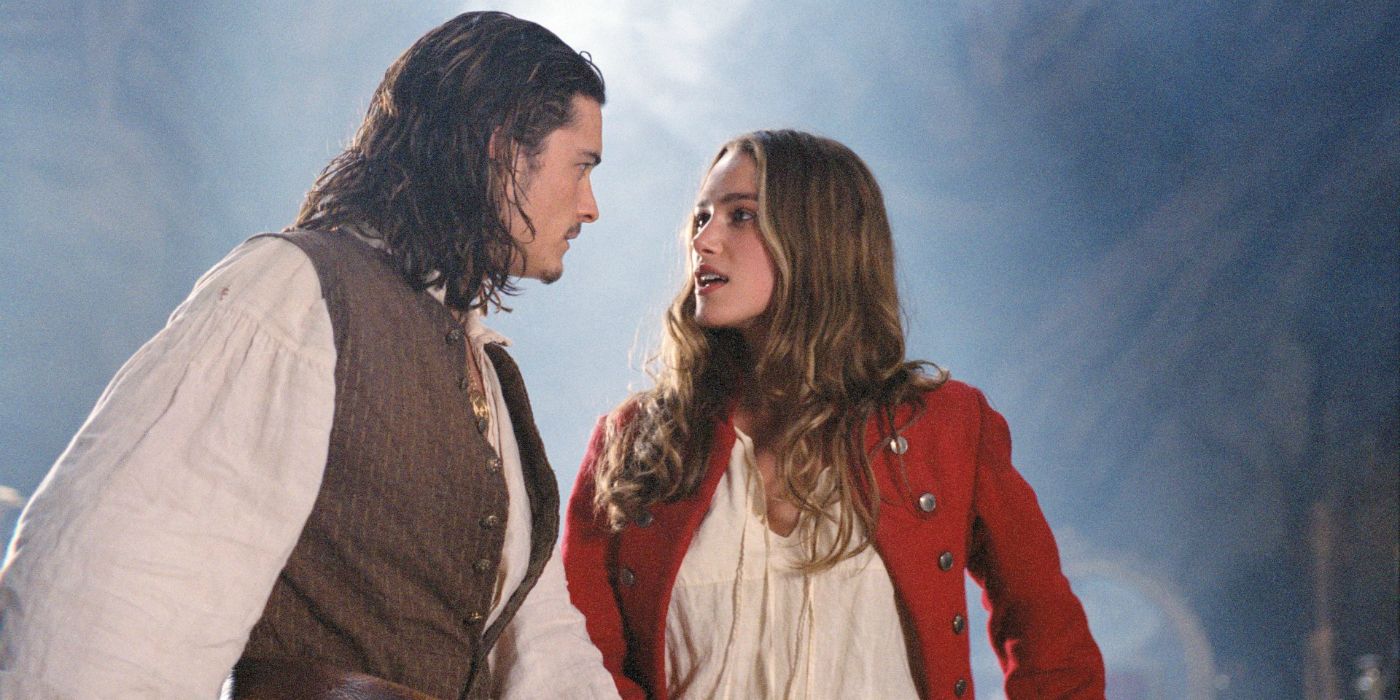
Sorry for not specifying in the title, I was trying to keep the length somewhat manageable, but this piece will only be looking at the first film in the series, Pirates of the Caribbean: The Curse of the Black Pearl. Please forgive me, I know how much everyone loves the sequels …
The question at the center of this film is a person’s capacity for treachery and what happens when someone breaks free of formality. From the moment Elizabeth finds this kid washed up and learns that he is somehow linked to piracy in all its violence and ruthlessness, she can’t help but dread the day that this capacity for atrocity arises in the man that she loves. Hence, she hides this heirloom hoping that it will keep this part of him locked away forever. But how could she? How could he? It’s literally his heritage.
This is where Jack Sparrow and this adventure on the high seas comes into play. Jack Sparrow is one of cinema’s most memorable characters for a number of reasons, but the nucleus of the Jack Sparrow appeal is that he is not contained by societal expectations. He is a living counteragent to the rigidity of the society both Will and Elizabeth are a part of. That is why he dresses, acts, and talks the way he does–and it’s also why the law enforcement also kind of wants to toss this guy in a cell.
Now, Jack’s total neutrality does entitle him to do some morally gray things. He holds Elizabeth hostage for a moment (and also makes a crude remark toward her as she’s applying his affects), even if he doesn’t physically harm her. He is also content to just straight-up sacrifice half of the Port Royal fleet at the end–and without even warning them that their enemy can’t be killed.

But there is a very distinct difference between Jack and the likes of Barbossa. Barbossa and his crew represent ravenous indulgence. They kill for gain and power, which is ultimately what led to their curse. Their appetites were insatiable, and so their punishment was that they would never be sated.
But Jack isn’t in the piracy game to conquer anyone, and while he is certainly not afraid of wealth, he also isn’t really motivated by gain. Jack lays out what it is that grabs him about the pirate’s life to Elizabeth during their brief stay on the deserted island. “What a ship is–what the Black Pearl is–is freedom.” Freedom is the ultimate prize that motivates Jack, not indulgence or material gain as with Barbossa. The faux-deal he strikes with Barbossa on Isla de Muerta would have been terribly out of character for him. So what if he gains two ships and a bounty out of the exchange? He just wants to eliminate the man who threatened his freedom.

Will and Elizabeth follow Jack over the edge because it will help them rescue the one they love. In making this jump, and in keeping company with a criminal pirate, they transgress a lot of societal norms (e.g. stealing a ship that doesn’t belong to them), but owing to their respective strong moral compasses, they abstain from anything that could be considered reprehensible. All the while, Will and Elizabeth both discover that they have qualities that really come to life here on the seven seas. They’re tactically clever, for one. They’re also willing to sail right into danger for a higher purpose. These are qualities which make them genuine rivals to Barbossa, and also what makes their adventure so fun.
Will and Elizabeth come out of this adventure much bolder, having finally found the courage to violate the social niceties that were keeping them apart: Will finally confesses his love to the girl who was way above his station, and Elizabeth turns down a comfortable but sterile future with Norrington. Even the pirates have their own regiments that they get to blur. It is the pirate’s code that dictates that Jack Sparrow ought to be left behind by the crew, but they eventually decide to go back for him anyway because they like him just that much.
Rules and expectations are in place for a reason, particularly as it pertains to spirituality and divine law. A total absence of boundaries paves the way for chaos and wickedness. But there is a difference between being faithful to a social code upon which we all depend and simply hiding behind the safety of formality and never taking any risk. There is something like divinity in freedom.














